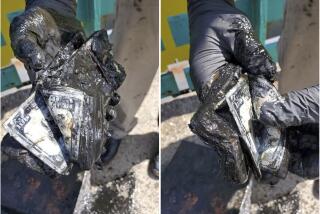Crooks Cash In by Depositing Checks That Turn to Confetti
- Share via
CHICAGO — Checks treated with a chemical that causes them to disintegrate into confetti shortly after being deposited have shown up in at least two states, costing banks nearly $70,000 since the beginning of the year, police said Thursday.
A check clearinghouse said it has warned 142 banks to be on the lookout for the dissolving checks, which may have an unusual odor and feel oily.
The checks have turned up at five or six banks in the Chicago area and at one in Tennessee, said Capt. James Zurawski of the Chicago Police Department’s financial crimes division. Authorities also are checking a report of a possible dissolving check in Indiana, Zurawski said.
“The one I’ve got in front of me looks like a handful of ashes,” Zurawski said.
The checks, supposedly drawn on personal accounts at banks in California and Tennessee, have been reported in about 12 incidents in recent weeks, costing banks about $70,000, he said.
In most of the cases, someone would open a new account at a bank with a small amount of money and later make a larger deposit with a dissolving check. Later, the money would be withdrawn from the account before the bank could learn that the second check was bogus. The check’s decomposition would leave little for evidence.
Sent Out Memo
Police believe that more than one person is involved in the scam but have no suspects because of the dissolving evidence, Zurawski said.
On Thursday, Zurawski’s office received copies of five checks for a total of $20,000 drawn on a Chicago bank and deposited at a Memphis, Tenn., bank.
“They’re in bits and pieces,” he said.
The Chicago Clearing House Assn., which clears checks for 142 members, sent out a memo March 9 warning of the dissolving checks, said Vice President Tom Tucker.
The association first learned of the checks from Northern Trust Bank, which has been hit by at least three of the disintegrating checks, Tucker said.
A Northern customer deposited $4,000 by check in a savings account on Feb. 16, then withdrew the same amount a week later from one of the bank’s branch offices, the memo said.
The $4,000 check that was deposited was returned to Northern on March 2 from a California bank that said the check had an invalid account number. But by then the check had been “reduced to mere confetti, small bits of paper that appeared to be treated with chemicals that caused the paper to break into pieces to a point where it was impossible to identify any information on the check,” the memo said.
Chicago police learned of the dissolving checks about two weeks ago, Zurawski said.
‘Some Kind of Chemical’
“What happened was two checks showed up in one of our downtown banks and they literally dissolved,” Zurawski said in a telephone interview.
The perpetrator is “using some kind of chemical” that makes the checks disintegrate about three to four hours after they’re deposited, he said.
“So far nobody’s been harmed by it. The only clue we’ve got is we’ve talked to the tellers. One teller says that the check felt oily; another said it had a funny aroma,” Zurawski said.
Northern learned on March 4 that two other checks for more than $8,000 dissolved after they were processed by Jewel Food Stores, which offers banking services for some banks’ customers.
Officers from the food chain told the bank that a worker saw one of the checks start “to sweat and deteriorate from its borders.” The worker tried to prevent further disintegration by putting the check in a paper envelope, but the envelope also began to dissolve, investigators said.
Northern Trust declined comment Thursday.
“We are not at liberty to discuss customer accounts,” said a spokeswoman who asked not to be identified.
Tucker said the association had turned the matter over to the financial crimes division.
Zurawski said the FBI had been notified but FBI spokesman Bob Long said the agency was not involved in the investigation.
A law enforcement official who asked not to be quoted by name said it would not take a chemical genius to devise a dissolving check.
More to Read
Sign up for Essential California
The most important California stories and recommendations in your inbox every morning.
You may occasionally receive promotional content from the Los Angeles Times.













